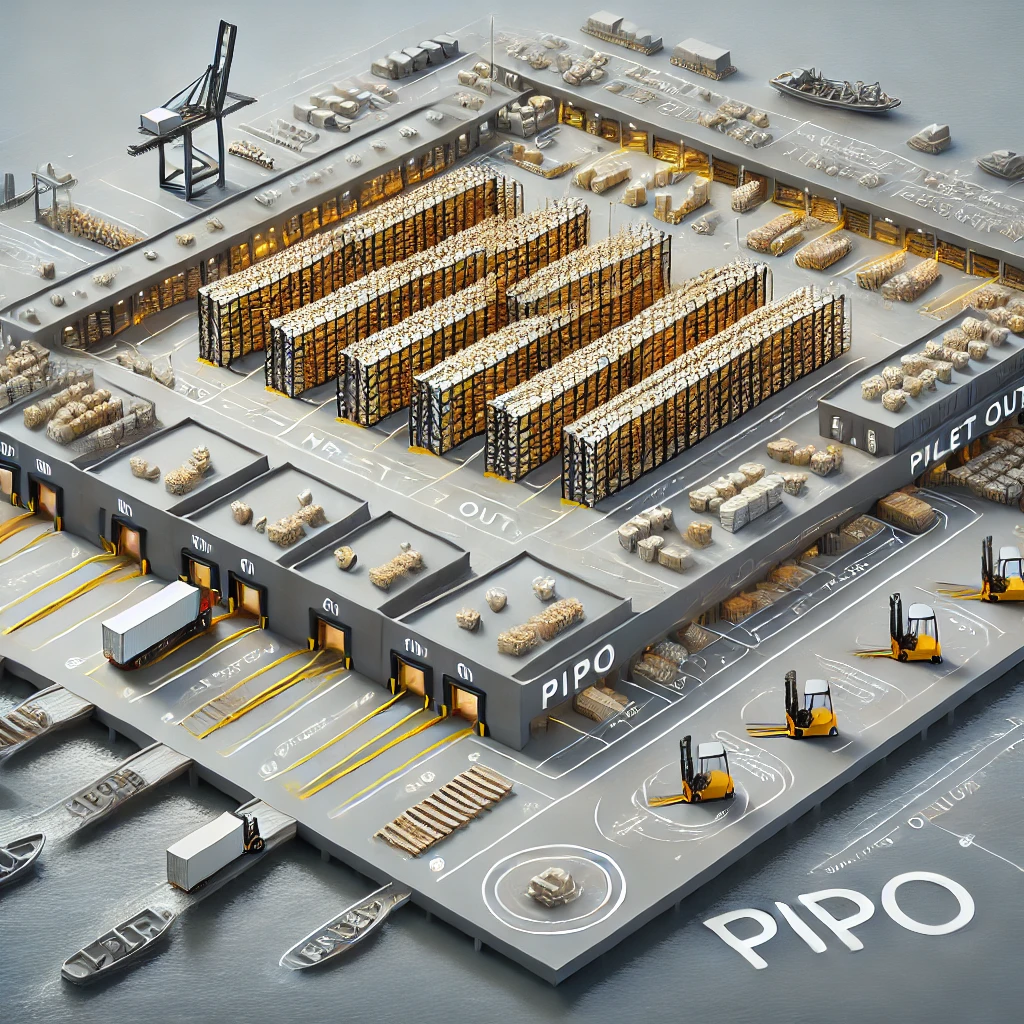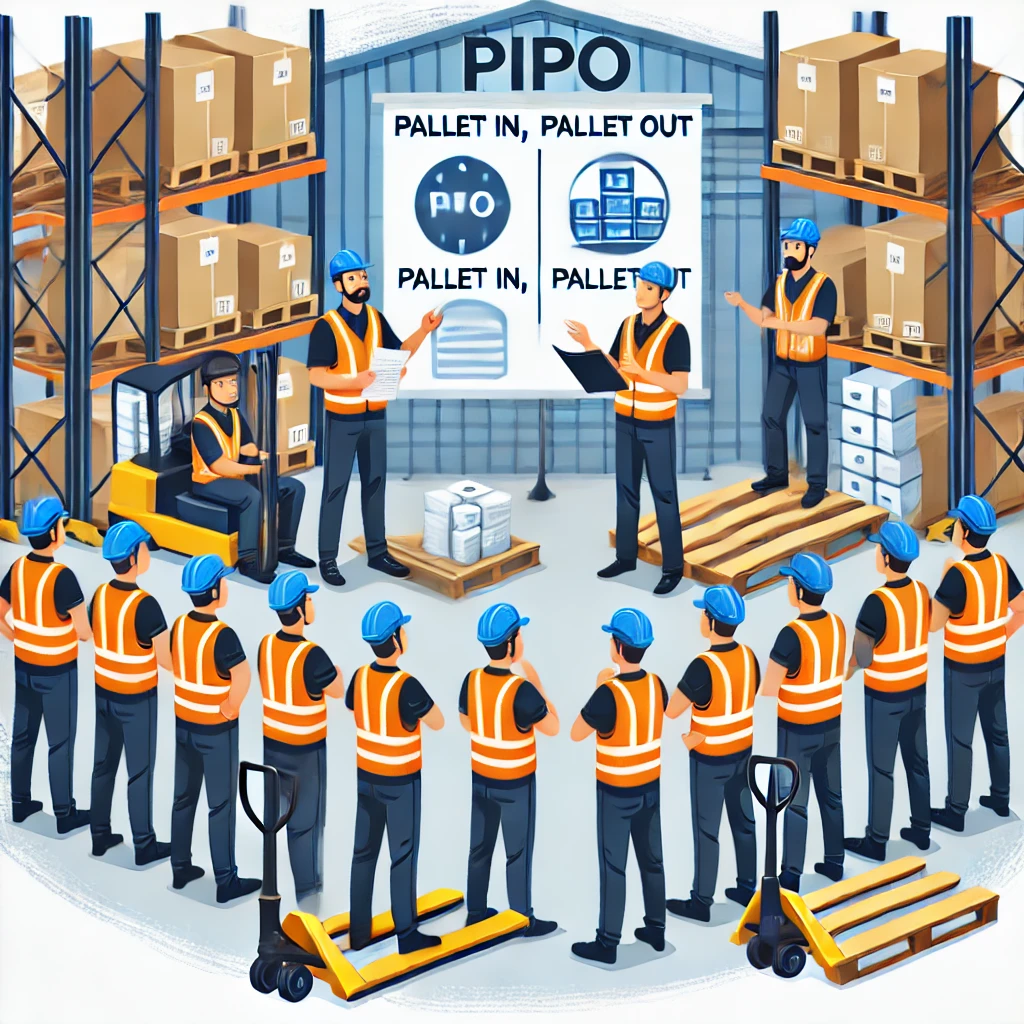Understanding PIPO (Pallet In, Pallet Out) in Logistics

What is PIPO?
PIPO, which stands for Pallet In, Pallet Out, is a logistics strategy that focuses on the efficient movement of goods using standardized pallets. This method emphasizes the importance of maintaining product integrity and streamlining warehouse operations by keeping items on pallets throughout the entire supply chain process.
PIPO Meaning in Logistics
In the context of logistics, PIPO refers to a system where products arrive at a warehouse on pallets (Pallet In) and leave the warehouse on pallets (Pallet Out). This approach minimizes handling, reduces the risk of damage, and increases overall efficiency in warehouse operations.
The Importance of PIPO in Modern Logistics
Understanding the significance of PIPO is crucial for anyone involved in supply chain management. Here’s why has become a cornerstone of efficient warehouse operations:
- Reduced Handling: By keeping products on pallets throughout the process, minimizes the need for individual item handling, reducing labor costs and the risk of damage.
- Increased Efficiency: PIPO streamlines loading and unloading processes, allowing for quicker turnaround times and improved warehouse productivity.
- Better Space Utilization: Standardized pallets enable more efficient use of warehouse space, both in storage and during transportation.
- Enhanced Inventory Management: PIPO systems often integrate with warehouse management software, providing real-time tracking and improved inventory accuracy.
- Improved Safety: By reducing the need for manual handling, systems can significantly decrease workplace injuries related to lifting and carrying heavy items.
How PIPO Works in Practice
To truly understand PIPO, it’s essential to know how it functions in a real-world logistics environment:
- Receiving: Products arrive at the warehouse on pallets. These are quickly scanned and entered into the inventory management system.
- Storage: Pallets are moved to their designated storage locations, often using forklifts or automated systems.
- Order Fulfillment: When an order is received, entire pallets or partial pallets are retrieved from storage.
- Shipping: Pallets are loaded directly onto trucks or containers for shipping, maintaining the integrity of the pallet load throughout the process.
PIPO vs. Traditional Warehouse Methods
To appreciate the benefits of PIPO, it’s helpful to compare it with traditional warehouse methods:
PIPO | Traditional Methods |
Minimal handling of individual items | Frequent handling of individual items |
Faster loading and unloading | Slower loading and unloading processes |
Reduced risk of product damage | Higher risk of damage due to frequent handling |
Efficient space utilization | Potential for inefficient space use |
Easy integration with automated systems | May require more manual processes |
Implementing PIPO in Your Warehouse
Adopting a PIPO system requires careful planning and execution. Here are some key steps to consider:
- Assess Your Current Operations: Evaluate your existing processes to identify areas where can bring the most benefit.
- Standardize Pallet Sizes: Choose pallet sizes that best fit your products and warehouse layout.
- Invest in Proper Equipment: Ensure you have the necessary equipment, such as forklifts and pallet jacks, to handle pallets efficiently.
- Train Your Staff: Provide comprehensive training to your team on the new processes and safety procedures.
- Implement Supporting Technology: Invest in warehouse management software that can support PIPO operations and provide real-time tracking.
- Optimize Warehouse Layout: Redesign your warehouse layout if necessary to accommodate pallet-based operations more efficiently.
Challenges in Implementing PIPO
While PIPO offers numerous benefits, it’s not without its challenges:
- Initial Investment: Implementing PIPO may require significant upfront costs for equipment and training.
- Space Constraints: Some warehouses may struggle to accommodate full pallet loads, especially for slow-moving items.
- Product Mix: PIPO works best with products that are frequently ordered in large quantities. It may be less efficient for businesses with a diverse product mix or many small orders.
- Supplier Cooperation: Successful implementation often requires cooperation from suppliers to deliver goods on standardized pallets.

The Future of PIPO in Logistics
As technology continues to advance, the future of PIPO looks promising:
- Integration with IoT: Internet of Things (IoT) devices can provide real-time tracking of pallets throughout the supply chain.
- Automated PIPO Systems: Robotics and AI are making fully automated systems a reality, further increasing efficiency and reducing labor costs.
- Sustainable PIPO: The focus is shifting towards more sustainable pallet materials and practices, aligning PIPO with environmental goals.
- PIPO in E-commerce: As e-commerce continues to grow, systems are being adapted to handle the unique challenges of online retail logistics.

How Linbis Helps Improve Organic Search Positions
Linbis, as a leader in logistics software solutions, plays a crucial role in optimizing PIPO processes and improving organic search positions for warehouses. Here’s how:
- Comprehensive Content Strategy: Linbis creates in-depth, SEO-optimized content on PIPO and related logistics topics, helping businesses rank higher for relevant keywords.
- Industry Expertise: By sharing expert insights on PIPO and warehouse management, Linbis establishes authority in the field, improving search rankings.
- User-Centric Design: Linbis’s software solutions incorporate SEO best practices, ensuring that warehouse websites using their tools are easily discoverable by search engines.
- Regular Content Updates: Linbis consistently refreshes its content to reflect the latest trends and innovations in PIPO and logistics, helping maintain relevance in search results.
- Data-Driven Insights: By providing warehouses with valuable analytics and performance data related to PIPO operations, Linbis enables the creation of unique, data-rich content that search engines favor.
- Mobile Optimization: Linbis ensures that all content and tools related to are mobile-friendly, a crucial factor in search engine rankings.
- Localized Content: For businesses operating in multiple regions, Linbis helps create localized content about , improving search visibility in specific geographic areas.
In conclusion, (Pallet In, Pallet Out) is more than just a logistics buzzword – it’s a fundamental shift in how warehouses operate. By embracing and leveraging advanced solutions like those provided by Linbis, businesses can significantly improve their operational efficiency, reduce costs, and stay competitive in the ever-evolving world of logistics. Understanding and implementing is not just about improving warehouse operations; it’s about positioning your business for success in the digital age of logistics.
